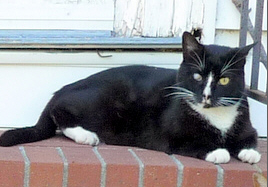R.I.P. BlackJack – 02/03/11 (With Update for Prince William – 01/27/13)
Of the profound wisdom that most of the world misses in its failure to understand Epicurus, one of the most important is found in the Second Principal Doctrine: the truth that we all meet death in the end, and that death brings neither heaven nor hell, but “nothingness” — simply the end of our existence and of our opportunity to experience the joys of life. Knowing that our lives will certainly come to an end, how can we afford to misuse the short time that we have?
The occasion for this post is the loss of our family pet “Blackjack” — a tomcat who wandered into our lives several years ago, and departed yesterday. Pets are certainly not human, but that does not stop us from bonding with them just as closely, and in many cases more closely. This observation, too, has Epicurean precedent, as it is frequently observed that Lucretius’ description of the heartache of the mother cow who has lost her calf to the sacrificial altar is one of the most moving selections in De Rerum Natura.
False religions overpower the weak with threats of punishment after death, and lure the gullible by promising rewards in a heaven that they can never deliver. Animals may be limited in their powers of intelligence, but how fortunate they are to be able to simply live their lives “in the moment” — pursuing the goals and drives that Nature has given them — without fear of deception by false threats and promises.
Blackjack lived — as best we could tell — a long and happy life for a cat, especially for one who spent much of his life outside. He lived and fought intelligently, and even after a cataract claimed much of the sight of one eye, his joy of life seemed undiminished. When his time came, he departed this life quickly and with an absolute minimum of suffering. In our own lives, can we really ask for much more than that?
Most people live their lives in denial that their own day of death will ever com. They procrastinate, waste the time they have in innumerable ways, and in the words of Metrodorus they pass away without ever having experienced “leisure.” Not so cats, dogs, and other animals who live simply as Nature provides that they live.
Not everyone can live in a rural setting or have personal pets to accompany them in life, but one of the many rewards of pet ownership is the opportunity to observe the cycle of life turning quickly, and to thereby observe, and perhaps understand better, how that same cycle applies to ourselves.
Several weeks ago I posted the following on Facebook, but I will include it here again to reinforce this point, which is so central to Epicureanism:
Carpe Diem! As you watch this video of Laurie Beechman, think of her incredible talent, and consider that she died of cancer at age 44, and see if this does not help to understand Lucretius’s point in Book III of De Rerum Natura, that no matter who you are, your time is limited?
“You well might think of saying to yourself – a better man than you will ever be, you reprobate – and many lords and kings, rulers of mighty nations, all have died. … Add to these philosophers and artists, all the throng blessed by the Muses; Homer’s majesty lies low in the same sleep ……as all the rest. … And Epicurus perished, that great man, whose genius towered over all the rest, making their starry talents fade and die in his great sunlight.
Who are you, forsooth, to hesitate, resent, protest your death?
UPDATE 01/27/13: Almost two years to the day after Blackjack died, his friend “Prince William” (thus named by the Humane Society) passed away as well. Here’s a photo of Prince William as he deserves to be remembered:



